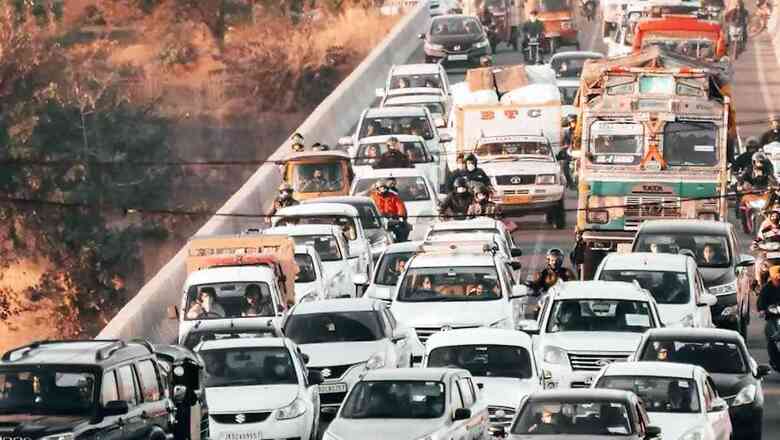
views
India’s road transport sector contributes significantly to the country’s carbon emissions. Decarbonising this sector requires a multi-faceted approach, including transitioning to electric and alternative fuel vehicles, improving public transportation infrastructure, and implementing sustainable urban planning. The government has already taken steps to promote electric vehicles, including tax incentives and subsidies for manufacturers and buyers. However, more needs to be done to address issues such as the lack of charging infrastructure and high upfront costs for electric vehicles. Additionally, promoting sustainable urban planning and improving public transportation can help reduce the number of vehicles on the road. Decarbonising the road transport sector in India is critical to achieving the country’s climate goals and improving air quality in cities. It requires collaboration between the government, private sector, and citizens to implement sustainable and innovative solutions.
The Need for Vehicle Scrappage Policy
As the number of registered vehicles continues to rise, so does the number of old and obsolete vehicles. Typically, a vehicle’s lifespan is around 10-15 years, depending on usage conditions. In India, however, vehicle owners tend to keep their vehicles for longer, even after they have passed their expected lifespan. These older vehicles tend to have higher emissions, lower fuel efficiency, and lower safety standards, which can lead to environmental and health hazards.
In 2015, it was estimated that over 8.7 million end-of-life vehicles (ELVs) were present in India, which is expected to rise to 21.8 million by 2025. This increase is directly related to the growth of the vehicular retail industry; at present, vehicles will eventually become ELVs.
Therefore, there is a pressing need to enforce a comprehensive policy on vehicle scrappage, including the mandatory scrapping of vehicles that have failed fitness tests. Such a policy could reduce the number of ELVs in India and promote the adoption of newer, more environmentally friendly cars. This would also improve road safety and fuel efficiency, which could help reduce the transportation sector’s carbon footprint.
In sum, the increasing number of vehicles in India and the tendency of vehicle owners to keep their vehicles beyond their expected lifespan are leading to a significant increase in the number of ELVs. A comprehensive policy on vehicle scrappage is required to address this issue. This can help promote using newer, more sustainable vehicles and reduce the environmental and health hazards of ELVs.
Policy Support and Investment for Sustainable Transportation Solutions
To reduce greenhouse gas (GHG) emissions, there is a requirement for greater policy support and investment towards implementing several transportation-related solutions, including car sharing, traffic management, electric vehicle charging and discharging, transportation planning, connected vehicles, and automated driving.
The use of Information and Communication Technology (ICT) has the potential to result in the implementation of more intelligent and efficient supply chains. This could be achieved by utilising advanced digital technologies like the Internet of Things (IoT), Artificial Intelligence (AI) and Blockchain. In summary, increased investment and policy support in these areas can lead to developing and adopting sustainable transportation solutions, reducing the transportation sector’s carbon footprint and contributing to global efforts to mitigate climate change.
Intelligent Traffic Management Systems, i.e. real-time traffic data, navigation systems, and traffic signal synchronisation, are a few ideas that can be implemented quickly. Monitoring traffic enforcement and vehicle fitness, PUC checks aided with technology monitoring will improve the results by leaps and bounds. Incentivisation of cleaner technology vehicles by fiscal and non-fiscal benefits like priority parking, zero registration fees, waiver of road tax, lower rate of finance, insurance etc., will further push the citizens towards environment-friendly vehicles.
Road to Decarbonisation: The Need for Integrated Approach
Despite several initiatives by policymakers and industry leaders to address road transport emissions, the reduction required to limit global warming to below 2°C or even 1.5°C, per the Paris Agreement, is enormous. There isn’t a silver bullet to address the decarbonisation of the road transport sector. A one size fits all approach for all vehicles may not be suitable for reaching the desired goals. A detailed analysis may be required to understand the above solutions’ impact on various categories (2W, 3W, Light, Medium & Heavy vehicles) and evolve an integrated and best-suited approach for the automotive industry. Decarbonising the road transport sector is heavily dependent on the electrification of vehicles, necessitating the rapid decarbonisation of the electricity sector, i.e. the generation, grid and transmission, particularly over the next 10-15 years.
There is no silver bullet to decarbonising the road transport sector. Different types of vehicles require different solutions, and a one-size-fits-all approach may not be effective. A detailed analysis is required to understand the impact of various solutions on different categories of vehicles, including two-wheelers, three-wheelers, light, medium, and heavy-duty vehicles. Therefore, an integrated approach is necessary to address the specific needs of each vehicle category and evolve a comprehensive policy that promotes the adoption of sustainable transportation solutions.
The electrification of vehicles is one of the most crucial steps towards reducing carbon emissions in the transportation sector. The rapid decarbonisation of the electricity sector, including the generation, grid, and transmission, is necessary to support the electrification of vehicles. Additionally, policies that incentivise the adoption of cleaner technologies, such as electric vehicles, will play a crucial role in achieving India’s decarbonisation goals.
Given the availability of multiple solutions, today, different ministries and various policymaking representatives are working separately to achieve the same goal, adversely affecting the ease of doing business for the industry and private sector. Therefore, the Central government could establish a nodal department to take care of the policy, incentivisation, enforcement and grievances. It will be helpful to drive the initiative of decarbonising the road transport sector in a more efficient, effective & coordinated manner, providing ease of doing business and minimum disruption to the industry.
Feroz Khan works leads the Regulatory Affairs & Policy Advocacy at world’s largest 2W maker, Hero MotoCorp; Anjal Prakash is Research Director, Bharti Institute of Public Policy at the Indian School of Business. Views expressed are personal.
Read all the Latest Opinions here


















Comments
0 comment